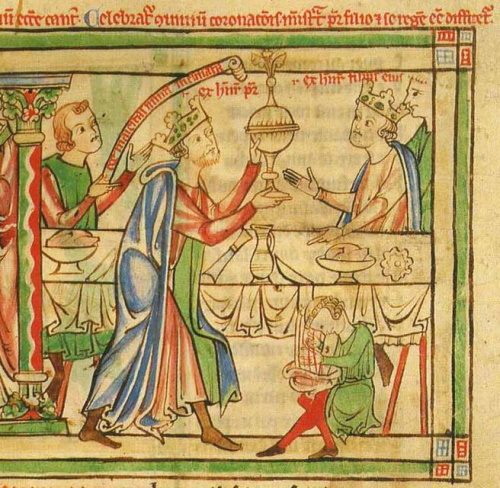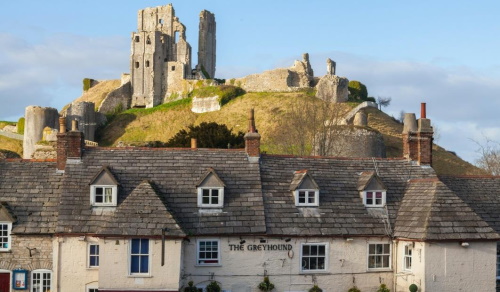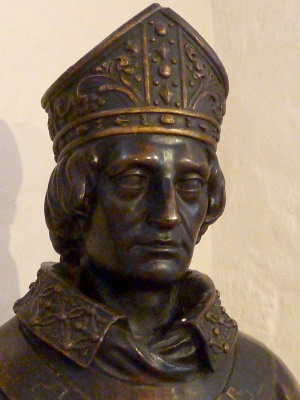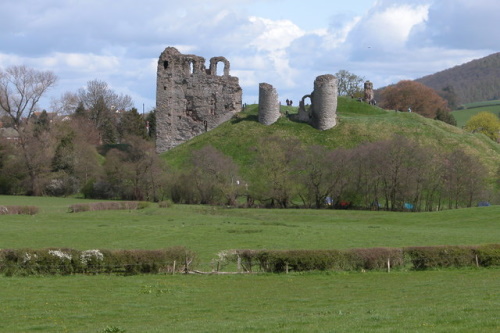The Years 1181 to 1246
Roger Mortimer (d1214)
Hugh Mortimer (d1227)
Ralph Mortimer (d1246)
We come now to the third of the Mortimer lords of Wigmore, Roger Mortimer (d1214). His date of birth is not known but, as his father Hugh lived to a ripe old age, Roger must have been an active adult for many years before inheriting the lordship of Wigmore. He first appears on the scene in 1174, fighting on the side of king Henry II during the great rebellion of the king’s eldest son Henry, ‘the Young King’. For one reason or another, however, Roger seems to have spent more time in disgrace than most of the Mortimers. The Welsh Prince Cadwallon was ambushed and killed by the Mortimers in 1179 while travelling under a ‘safe conduct’ from Henry II. Roger was personally blamed for the murder, though his father was still alive at that time, and was imprisoned for 2 or 3 years in Winchester by an angry king.
Having previously fought for the king against the supporters of his older sons (Henry, Richard and Geoffrey), Roger seems to have preferred the younger son, John, and he was to remain remarkably loyal to King John during his disastrous reign. In 1191, after the death of Henry II, Roger was suspected by the Justiciar, William de Longchamp, of plotting with the Welsh on John’s behalf, against the largely absent new king, Richard I. William confiscated Wigmore and exiled Roger for 3 years.
Problems with the Welsh continued during his lordship but Roger made great efforts to regain lost ground. In 1194 he recovered Maelienydd and rebuilt Cymaron. But there were setbacks: in 1196 he joined forces with Hugh de Say of Richard’s Castle but they were heavily defeated by Rhys ap Gruffydd at New Radnor with great loss of life. By 1200 he had conquered Maelienydd again and issued a new charter to the abbey at Cwm Hir that had been founded by Cadwallon. But the peace was never very stable and in 1202 his castle at Gwerthrynion was destroyed.

Henry, the ‘Young King’ being served at table
by his father king Henry II after his coronation

Corfe Castle – Maud de Braose, mother of Hugh’s wife Annora,
was starved to death in the dungeon here by King John
On the wider stage, things were not going well. In 1204 King John finally lost Normandy. Roger had less to lose in France than some barons and he continued to support John. In 1205 he was captured in Normandy and imprisoned, probably for organising resistance. By 1207 he was back in England having been ransomed.According to the Wigmore Chronicle, Roger was married twice. By his first wife, Millicent, he had a son, Hugh, who succeeded him. By his second wife, Isabel, he had three boys, the eldest of whom, Ralph, became lord of Wigmore when his half-brother Hugh died without children.
A striking example of the Mortimers’ attachment to King John occurred in 1208. Roger’s son Hugh Mortimer (d1227) was married to Eleanor or Annora, daughter of King John’s favourite, William de Braose. When John turned against William things became rather difficult for the Mortimers. William fled and Hugh’s wife Annora was imprisoned for a time, suspected of conspiring against John. Despite his wife’s incarceration, Hugh and his father Roger remained loyal to the king even as the majority of English barons turned against him.
On the death of his father in 1214, Hugh became the 4th Mortimer Lord of Wigmore. Though not present at the signing of Magna Carta at Runnymede, he was clearly a trusted supporter. When the young King Henry III succeeded John in 1216, Hugh was chosen to be a member of the Regency Council and he is listed as one of the witnesses to the re-issue of Magna Carta in 1225. During Hugh’s lordship he also had to cope with the resurgent Welsh under Prince Llywelyn ab Iorwerth (Llywelyn the Great). All his father’s good work was undone as Maelienydd fell to the Welsh, together with the border town of Knighton. In 1223 a confident Llywelyn made incursions into Shropshire, capturing Kinnerley and Whittington castles. In the hope of establishing a lasting peace, Archbishop Stephen Langton organised a meeting in 1224 between Henry III and Llywelyn in Ludlow Castle. Though there is no evidence to support this, it seems not unlikely that, as a powerful local supporter of the king, Hugh would have been present at that meeting.
Hugh Mortimer died in his prime in 1227 while competing in a tournament. As he had no children, the lordship of Wigmore passed to his half-brother Ralph Mortimer (d1246) who became the 5th Lord of Wigmore. Ralph has been described as a vigorous and warlike man. He fought against the French and was captured, but for most of his life he was concerned primarily with the Welsh problem.
Having been successful in regaining large areas of Wales previously held by Marcher lords, Llywelyn sought to strengthen his position. He married several of his daughters into Marcher families including Gwladus Ddu (‘the dark-eyed’) who married Reginald de Braose, Lord of Brecon & Abergavenny. After Reginald’s death, she married again, this time to Ralph Mortimer, Lord of Wigmore. Gwladus’s mother, Joan, was thought to be an illegitimate daughter of King John, so this marriage linked the Mortimers not only to the Welsh rulers of Gwynedd but also to the English Crown.

Archbishop Stephen Langton was an implacable enemy of King John and an energetic leader of the barons

Clun castle in Shropshire
Despite this marriage, there seems to have been no love lost between Llywelyn and Ralph who remained determined to regain his Welsh possessions. In 1228, Henry III ordered him not to break the truce by taking hostile action against Llywelyn. By 1231, however, Llywelyn was carrying out daring raids into England and Ralph was appointed custodian of Clun castle, tasked with protecting the King’s lands. The death of Llywelyn in 1240 was a turning point and Henry III began a campaign to win back all the lands lost over the previous 20 years. He granted Maelienydd to Ralph and acknowledged the right of Marcher lords to wage war on the Welsh. Ralph regained Maelienydd by force and rebuilt Cefnllys and Knucklas castles. Just before his death in 1246 he was being ordered to harass the Welsh between Brecon and Shrewsbury and enforce a trade embargo. Throughout his life he was a loyal and effective supporter of the king: someone who could be completely relied upon in difficult times.